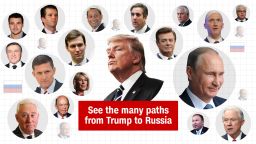Story highlights
Trump shared classified information with the Russian foreign minister last week
The White House dismissed the report Monday night
President Donald Trump insisted Tuesday he had the right to share information with Russia related to terrorism and other issues, his first public response to the revelation he disclosed classified information at an Oval Office meeting last week.
“As President I wanted to share with Russia (at an openly scheduled W.H. meeting) which I have the absolute right to do, facts pertaining to terrorism and airline flight safety, Humanitarian reasons, plus I want Russia to greatly step up their fight against ISIS & terrorism,” he tweeted.
Trump’s tweets Tuesday notably lack any mention of whether the information he shared was classified.
And the remarks appear to contradict statements made by his national security adviser, H.R. McMaster – who told reporters in the wake of the report that the story “as reported is false” – and White House deputy national security adviser for strategy, Dina Powell, who said Monday “the story is false. The President only discussed the common threats that both countries faced.”
Trump shared highly classified information with the Russian foreign minister and Russian ambassador to the US in a White House meeting last week, The Washington Post first reported Monday.
Two former officials knowledgeable of the situation confirmed to CNN that the main points of the Post story are accurate: The President shared classified information with the Russian foreign minister.
Trump did not directly reveal the source of the information, but intelligence officials told CNN that there is concern that Russia will be able to figure out the highly sensitive source.
The White House dismissed the report Monday night, issuing several statements before sending McMaster before White House reporters.
“At no time were intelligence sources or methods discussed and the President did not disclose any military operations that weren’t already publicly known,” he said. “I was in the room. It didn’t happen.”
Soon after Trump defended his handling of the Russia meeting, he then reiterated his longstanding call to find leakers in the intelligence community, saying he had called on former FBI Director James Comey and others to investigate “from the beginning of my administration.”
Intel analysts outraged
Early responses to the bombshell report indicate that, if true, handling sensitive details in this manner would have broad implications on US partnerships around the world and could place the lives of agents in the field at risk.
“Never before have I witnessed a senior government official so carelessly threaten an intelligence-sharing relationship,” a former senior intelligence official told CNN.
Mark Hertling, a national security, intelligence and terrorism analyst for CNN, said giving Russia information has not historically led to them being forthcoming with the United States.
“I’m concerned about the fact that the President feels like he has to give something to Russia first when there have been repeated instances of Russia being sanctioned in Ukraine, committing war crimes in Syria and conducting operations that are contrary to what we’d like to believe are freedom of operations and sovereignties of different nations,” he said Tuesday on CNN’s “New Day.” “This confuses me to no end.”
Phil Mudd, a former CIA analyst, said on “New Day” the fact that Trump chose to discuss classified information but did not ask Russia about its role in the 2016 election is problematic.
“This isn’t the biggest news out of that meeting,” he said. “Why is nobody talking about the President feels the responsibility to be more courteous to the Russians than to the American people.”
“He didn’t talk about election meddling,” the CNN counterterrorism analyst added. “It’s his first face-to-face with the Russians and the secretary of state and the President can’t say, ‘You shouldn’t be meddling in our election’ but he can fire Comey for investigating that? You’ve got to be kidding me.”

The potential consequences could hardly be more serious, former CIA case officer Bob Baer told CNN’s Erin Burnett Monday night.
“The President, by revealing this to the Russians, has lost control of this information. It’s going to go to the Syrians, It’s going to go to the Iranians – Russian allies,” Baer said.
“The ability to protect that source whoever he is, wherever he is has been seriously undermined … If a CIA officer had revealed this information to the Russians, he would be fired instantly.”
Leon Panetta, a former secretary of defense and CIA director, said Trump had a responsibility to be more careful with sensitive information.
“He is President of the United States. He is not a reality TV star. He is not just another personality. He is President of the United States,” he said Tuesday on “New Day.”
Putin requested meeting
The Wednesday meeting between Trump, Lavrov and Kislyak had already raised alarm bells in Washington, primarily because it came one day after Trump decided to fire Comey while the bureau investigated his campaign’s alleged ties to Russia.
The meeting, a personal request from Russian President Vladimir Putin – who asked that they meet when he spoke with Trump earlier this month – was supposed to remain behind closed doors without any media coverage. But a photographer from Russian state-media Tass attended the meeting and took photos of a laughing Trump with Lavrov and Kislyak.
No US media were allowed into the meeting.

Though an angry White House official told CNN they felt “tricked” by the Russians, White House spokeswoman Sarah Huckabee Sanders said “proper protocol was followed” by not allowing media into the meeting.
Throughout the 2016 campaign, Trump slammed Hillary Clinton for storing classified information on her private email server.
“Crooked Hillary Clinton and her team ‘were extremely careless in their handling of very sensitive, highly classified information,’ Trump tweeted in July. “Not fit!”




